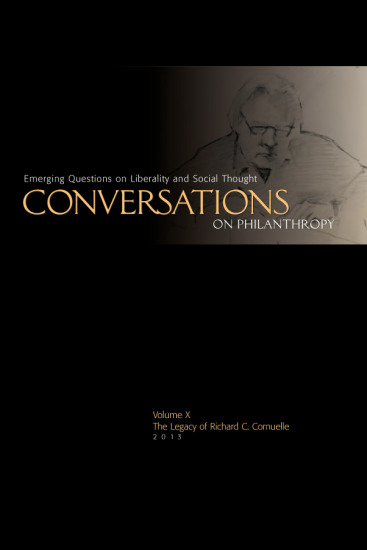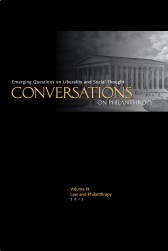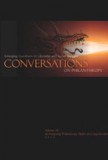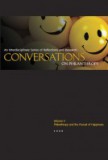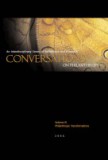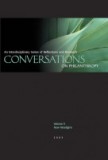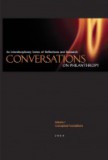Interested in learning more? Subscribe to our mailing list.
Conversations on Philanthropy is an annual publication of The Philanthropic Enterprise. Seeking to ignite reflection and discussion on the role of beneficence in the social order, Conversations features academic papers, essays, and reviews by scholars, philanthropists, and social entrepreneurs

Volume V
Philanthropy and the Pursuit of Happiness, 2008
Download the entire journal as a PDF ![]()
The problem of human happiness—how to attain it and how to preserve it—is perennial. It may be, however, that the psychological imperative to achieve our own happiness as well as the philanthropic imperative to promote the happiness of others on a global scale are ascending to ever new heights. The psychological pursuit of happiness and the philanthropic impulse toward benevolence find their intersection in the socio-biology of human beings, who seem readily to experience a fellow-feeling variously described as compassion or sympathy. The Confucian sage Mencius (fl. 4th century BCE) aptly described this visceral commiseration typical of mankind:
- Mencius said, 'All men have a mind which cannot bear to see the sufferings of others.
- 'When I say that all men have a mind which cannot bear to see the sufferings of others, my meaning may be illustrated thus:—even now-a-days, if men suddenly see a child about to fall into a well, they will without exception experience a feeling of alarm and distress. They will feel so, not as a ground on which they may gain the favour of the child's parents, nor as a ground on which they may seek the praise of their neighbours and friends, nor from a dislike to the reputation of having been unmoved by such a thing.
- 'From this case we may perceive that the feeling of commiseration is essential to man ….’ (Mencius, Book II, Chapter 6)¹
The observation of the natural sympathy of men for one another is also the starting point of Adam Smith’s considerations in The Theory of Moral Sentiments. “How selfish soever man may be supposed,” Smith wrote, “there are evidently some principles in his nature, which interest him in the fortune of others, and render their happiness necessary to him, though he derives nothing from it, except the pleasure of seeing it.”
The papers in this volume of Conversations on Philanthropy, “Philanthropy and the Pursuit of Happiness,” shine light on the complex interplay between our understanding of happiness and our use of philanthropy to pursue happiness for ourselves and others. What is happiness? What are its conditions, circumstances, and causes? Is happiness in itself the ultimate end of human action? How do we know when we, or the objects of our beneficence, have obtained it? Read More...
STEVEN D. EALY is a Senior Fellow at Liberty Fund, Inc., an Indianapolis-based educational foundation. He previously taught at Western Carolina University and Armstrong Atlantic State University. He has published on Jurgen Habermas, bureaucratic ethics, the Federalist Papers, and Robert Penn Warren.
HANS L. EICHOLZ received his doctoral degree in American history from UCLA, where he studied with the noted historian, Professor Joyce Appleby. He is currently a Senior Fellow with Liberty Fund, Inc., an educational foundation that is based in Indianapolis, IN and conducts programs to explore the importance of individual liberty and personal responsibility throughout the U.S. and abroad. He has written on a range of subjects including banking history, civil society, Jefferson’s foreign policy, federalism, the meaning of equality in the early republic, and education. Most recently, he has written on the relationship of the judiciary to primary and secondary education, and contributed an essay on the nature of the Madisonian dilemma of the Arizona state constitution in a two volume collection, The Constitutionalism of American States, published by the University of Missouri Press that examines all fifty state constitutions. He is also the author of Harmonizing Sentiments: The Declaration of Independence and the Jeffersonian Idea of Self-Government (Peter Lang, 2001).
ROBERT F. GARNETT, JR. is Associate Professor of Economics at Texas Christian University. His work in the philosophy, history, and pedagogy of economics has appeared in a range of heterodox journals including Rethinking Marxism, the Journal of Economic Issues, the Review of Political Economy, the Review of Austrian Economics, and the Post-Autistic Economics Review. His current research examines the goals and methods of liberal learning in undergraduate economic education, the meaning and requirements of pluralism in economic inquiry, and the relationship between commercial and philanthropic forms of economic cooperation.
RICHARD GUNDERMAN majored in biology and philosophy at Wabash College, then received his PhD (from the Committee on Social Thought) and MD as a member of the Medical Scientist Training Program at the University of Chicago. He is currently Associate Professor of Radiology, Pediatrics, Medical Education, Philosophy, Liberal Arts and Philanthropy at Indiana University, where he is also Vice Chair of Radiology and Director of Pediatric Radiology. The recipient of numerous awards for teaching, scholarship, and writing, he regularly teaches medical imaging, medical ethics, and the ethics of philanthropy. He is the author of two books and over 100 scholarly articles.
MICHAEL STRONG is a pioneer in education and independent learning. He is the author of The Habit of Thought: From Socratic Seminars to Socratic Practice, and the founder of innovative Socratic, Montessori, and Paideia schools and programs in Alaska, Florida, California, Texas, and New Mexico. Moreno Valley High School, the charter school for which Michael was the founding principal, was ranked the 36th best public high school in the U.S. on the Washington Post's 2006 Challenge Index. Michael is co-founder and serves as Chief Executive Officer and Chief Visionary Officer of FLOW, a non-profit devoted to "Liberating the Entrepreneurial Spirit for Good."
—Robert F. Garnett, Jr.
In his Afterword to the 1993 edition of Reclaiming the American Dream: The Role of Private Individuals and Voluntary Associations (1993 [1965]), Richard Cornuelle laments that so few libertarians have embraced his vision of a flourishing voluntary community beyond the commercial sphere: “Most of my libertarian friends were willing to discuss possible market solutions to public problems, but, lacking any analytical device but market theory, continued to believe that anything that could not be done profitably should probably not be done at all” (186). Cornuelle’s remark points to an enduring gap in modern liberal thought. Most philosophical liberals celebrate philanthropy—“voluntary giving and association that serves to promote human flourishing” (Ealy, 2005, 2)—as a Tocquevillian alternative to the welfare state, yet their stock in trade conceptions of the free society tend to omit philanthropy, theorizing voluntary cooperation as an exclusively commercial affair. Read More...
—Hans L. Eicholz
History does not repeat itself, but some questions are worth asking repeatedly. Such are questions about the nature of the good life: What is it? How do we get it? Every age has posed these queries, but because the answers have been so varied, the hope of many has been to seek a core element in a common human nature that will finally settle the matter. Read More...
—Michael Strong
After a century in which behaviorism and Freudianism were the dominant schools of psychological thought, positive psychology is a breath of fresh air. Behaviorism assumed that humans were reactive mechanisms whose internal mental, emotional, and spiritual lives could be dismissed as mere epiphenomena. Freudianism reduced the complexity of human motivation to a few fundamental “drives” associated with sex and aggression, and dismissed our understandings of our motives as delusions. Both regarded as irrelevant nonsense any view of human beings as intentional agents. Read More...
—Richard B. Gunderman
I thought, “I am perishing of cold and hunger, and here is a man thinking only of how to clothe himself and his family, and how to get bread for them. He cannot help me.” When he saw me he frowned and became still more irritable and passed me by on the other side. I despaired. But suddenly I heard him coming back. I looked up, and did not recognize the same man. Before, I had seen death in his face. But now he was alive, and I recognized in him the presence of God.
Tolstoy, What Men Live By (1881)
Is happiness an elevated mood? Can any amount of neural, hormonal, or pharmacological stimulation ever make us truly happy? In cases of depression, such stimuli may indeed open the door to happiness. Yet perhaps there is more to happiness than just chemicals; perhaps it includes something that cannot be imposed from outside. Perhaps the gateway to happiness is one through which we must walk on our own power. I would suggest that the happy person is a thriving person, someone who is firing on all cylinders and genuinely blossoming as a human being. In this case, someone else can no more make us happy than make us free or wise. Read More...
—Steven D. Ealy
As the preceding essays illustrate, the new field of positive psychology offers a fuller picture of human flourishing than does disorder-oriented clinical psychology, but it also presents certain dangers itself that need to be recognized and either avoided or, if possible, corrected. In my comments I will touch on each essay and then close with a few general observations about positive psychology.
Robert Garnett uses the insights of positive psychology to analyze and correct F. A. Hayek’s critique of philanthropy as an atavistic activity incompatible with the modern extended order. In Garnett’s account, Hayek argues that “Modernity has spawned a new moral code in which humane ends are better served by commerce than philanthropy by ‘withholding from the known needy neighbors what they might require in order to serve the unknown needs of thousands of others’ ” (Garnett 2008, 1-2). This touches on one of the problems Hayek investigated throughout his career—“the knowledge problem.” If all we can know is what we can see with our own eyes, we are necessarily tied to the biblical world of one’s neighbor or Aristotle’s world of a small, face-to-face economic community that can be organized and controlled by one man. As Hayek’s discussion of Adam Smith shows, however, the great advantage of markets is that they provide signals that allow individuals to act in ways beneficial to people far beyond their circle of personal acquaintance. Read More...

